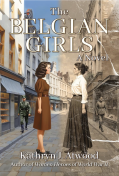
LitPick Review
The Belgian Girls tells two stories. The first chronological one is that of Gabrielle “Gaby” Petit, a barmaid in pre-WWI Belgium. Infuriated by the presence of German soldiers in her country, she organizes a spy network to pass information and defeat her country’s enemies. The second story is that of Julienne Gobert, newly arrived in Brussels with her widowed father. She hears the story of Gaby Petit and is inspired to also become a spy and Resistance fighter against the Nazis as they devour the country around her.
Opinion:
The Belgian Girls combines the adventures of two women, a real life figure, Gabrielle Petit, and a fictional one, Julienne Gobert, from the two different World Wars to tell an intergenerational story of courage, sacrifice, freedom, heroism, and rebellion against oppression.
The stories perfectly merge together with characters, plot threads, and situations that link the two together. For example, both protagonists were recently hit with trauma even before their involvement with the war efforts. The end of a disappointing love affair causes the orphaned and lonely Gaby to attempt to take her own life. The unexpected death of Julienne’s mother causes the girl and her father, Maurice, tremendous grief and mental anguish as they live with his domineering sister, Cecile. These losses leave these young women feeling unprotected in a changing world that is becoming more complicated, but they also test their resilience, independence, and willingness to challenge their surroundings.
We also see how the intervening years change various characters as both Gaby and Julienne meet them at different times in their lives. The character who started out as a snooty heiress who thinks she’s better than Gaby becomes a hard-hearted collaborator with the Nazis so she can hold onto her life and status when seen through Julienne’s eyes. The flirtatious and charming soldier Gaby meets becomes a kind but anxious and nervous authority figure by the time Julienne encounters him. Friends, family members, allies, and enemies appear and reappear in the lives of both women and affect their journeys for good or bad.
The dual narration of the book shows how important it is to look to the past and learn how to live during tough times. Those tough times bring out the best in both women. Gaby is a woman used to living a hardscrabble existence but also has deep emotion that can’t always be contained or controlled. This tough life and deep emotion allows her to empathize with her fellow Belgians, as they are under German occupation. That experience emboldens her, and she is inspired to fight for her country and freedom. She goes on missions putting herself in danger, but it builds within her a love of freedom and country which she fights for to the end.
Gaby’s story inspires Julienne during her struggles with the Nazis. Julienne starts out as a mousy girl too shy and nervous to speak up when a Jewish man is getting hurt outside her family’s store. Her fascination with Gaby’s life begins when she sees her statue. She is curious about the young woman whose defiant pose and words fascinated a nation. Even though the story of Gabrielle Petit is buried during Nazi rule, Julienne manages to piece it together from people who knew her. Julienne begins her own transformation into someone who is no longer afraid to stand up for her principles and for others. After the arrest of some friends, particularly her best friend, Julienne accepts the spark that was lit by Gaby all of those years ago. She too undergoes dangerous missions to protect people from the Nazis and pass information to the Resistance. Like Gaby, she will fight for her people, her country. She will fight and die if she has to.
The stories of Gabrielle Petit and Julienne Gobert remind us that one of the best ways to survive tough times of war, violence, tyranny, death, oppression, and poverty is to look to the past and how others lived during them, adapted to their surroundings, fought against them, and became heroes. Perhaps in doing so, they can be heroes in the present.


